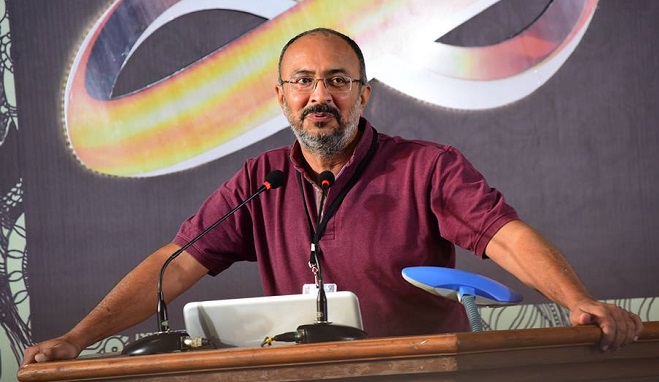We all know the basic story of Ramayana and Mahabharata. But how many of us understand the complexities of human nature that they depict? Very few.
And among the ones who follow these texts and feel so strongly about their relevance in the contemporary world is Anjum Rajabali. The screenwriter of some of the popular Bollywood films like Ghulam, Pukar, Rajneeti and Chakravyuh, Rajabali took a session on ‘Indian Mythology and its Relevance to Modern Screenwriting’ on the first day of Animation Masters Summit 2017 in God’s own country Kerala.
Not having worked in animation directly, he still feels that it has the opportunity to explore topics which live-action cannot.
“What is a story?” he asked the audience. “A story is not a documentation of life. A story is not something that faithfully depicts reality and facts. In fact, it is far from it. A story is a dramatisation of life-like events, designed to make sense.” Why is this an inherent need? “Because life when you look around, most of the times doesn’t make sense.” Stories therefore have been eternally there since the advent of civilisation, “since the time human beings learnt to communicate with each other.” Stories helped the bewildered listeners to make sense out of life.
Quoting a legendary director he said, “Reality and life don’t have to make sense, fiction and screenwriting have to.”

Stories are about truth, he feels. Truth, which is not always visible and easily available when the events of life unfold. “Stories are meant to engage and also disturb. Artists are meant to comfort the afflicted and afflict the comforted,” he said. A storyteller’s job is to become the psychologist of the society and dive into the contradictions of human nature to find its cause. Human beings are as capable of love, nurture, sublime artistic work as they are of the most horrific violence possible. “This is why stories become absolutely essential to be able to adapt empathetically and compassionately.”
What is mythology? “Let me first tell you what mythology is not.” Questioning popular and traditional notions of mythology, he said, “Mythology is not a religious text. It derives nothing from rituals. It is not a prescriptive text on the way of life.” Calling himself a student of mythology and the one who is fascinated by it, he said that it is a deep, sensitive and astute examination of the human condition, of what it is like to live. “It is a dramatised depiction of inner dilemmas and inner turmoil, which reflects the magnitude of the deep instinctual forces in human beings.” Mythology is a wise look at life.
“Stories are the most essential artistic expression. What we need desperately is great stories – about us, our experiences and the turmoil that India and our world is going through.” We draw narratives and nourishment’s from mythological archetypes. While writing for the film Rajneeti, he derived the character nuances from Mahabharata, and this is what Rajabali advices all the storytellers – to read these texts to understand the complexity of human nature and imbibe them in their characters.
The depictions of Sita and Draupadi shown in movies and live-action TV shows are meek and submissive which was not the case. Drawing references from Ramayana and Mahabharata, he said that women are not weak and powerless like portrayed in the movies and the stories which do not tend to understand mythology in its complete sense. “If you will be able to discard this shallow opinion, you will be able to recognise the strength and power of these women.”
“Mythology unites the country,” he said. A humble man but who stands strongly for his beliefs, Rajabali – with his powerful speech – held the crowd’s attention throughout his one and a half hour long session with ease. And in the end, he gave only one advice, “Read. It will be an eye-opener.”
